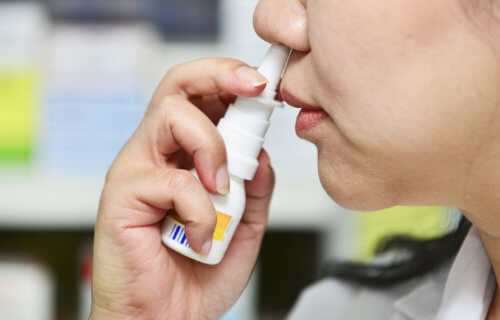DALLAS — A nasal spray might soon offer relief for people suffering from sudden rapid heartbeats. Researchers from Weill Cornell Medicine at New York-Presbyterian Hospital say this treatment could allow patients to address their symptoms as soon as they manifest, potentially avoiding the need for emergency medical visits.
This innovative approach is still awaiting the green light from the U.S. Food and Drug Administration (FDA).
“This is a potential new and exciting option for patients to safely self-treat their rapid heartbeat without direct medical supervision to avoid emergency room visits and medical interventions,” says study lead author Dr. James E. Ip, an associate professor of clinical medicine at Weill Cornell Medicine, in a media release.
Rapid heartbeat episodes, scientifically known as “paroxysmal supraventricular tachycardia,” occur when the heart rate exceeds 100 beats per minute, sometimes even reaching between 150 and 200 beats. Roughly one in 300 Americans experience these episodes, which are linked to the heart’s lower chambers.
The usual remedy involves specific physical actions named “vagal maneuvers.” A common maneuver requires individuals to exert pressure as if they’re about to breathe out, but without actually exhaling. The purpose is to prompt the vagus nerve to moderate the electrical activity traveling through the heart’s atrioventricular (AV) node, ensuring proper heart rhythm. When these maneuvers fail, which can occur 20 to 40 percent of the time, individuals must rush to an emergency room for intravenous medication to restore a regular heartbeat.
Paroxysmal supraventricular tachycardia is responsible for around 50,000 emergency room visits annually in the U.S.

In an earlier study, participants used the drug etripamil, administered using a nasal spray, during a rapid heartbeat episode. They wore an electrocardiogram (ECG) patch — a heart monitor that communicates wirelessly with smartphones — during treatment. This method proved efficient as 54 percent of patients experienced normalized heart rates within half an hour, which was a significant improvement over the 35 percent observed in those using a placebo spray.
The current study expanded on these findings, allowing participants to use etripamil during multiple episodes. Results demonstrated that:
- Etripamil normalized heart rate within 30 minutes for 60.2% of the episodes, and within an hour for 75.1% of the cases.
- Side-effects were minor and primarily nasal in nature. There were no severe heart-related adverse effects reported.
Dr. Ip believes that the etripamil nasal spray might become as pivotal for rapid heartbeat patients as albuterol inhalers are for asthma sufferers or epinephrine pens for those with severe allergies.
”There are no great options for patients to self-treat paroxysmal supraventricular tachycardia, and this condition can cause significant distress and anxiety,” says Dr. Ip. “Similar to an albuterol inhaler for asthma patients or an epinephrine pen for patients that have severe allergies or anaphylaxis, etripamil nasal spray may be a great option for people who have paroxysmal supraventricular tachycardia.”
This study, which spanned from December 2018 to October 2020, involved participants primarily diagnosed with paroxysmal supraventricular tachycardia. While the current research was predominantly with White adults, scientists believe the findings could be relevant for other racial and ethnic groups.
Further studies are set to assess the nasal spray’s impact on children and its efficacy in treating other heart conditions, like atrial fibrillation — a condition characterized by rapid and irregular heartbeats from the heart’s upper chambers.
The study is published in the Journal of the American Heart Association.
You might also be interested in:
- Spraying gold particles on the heart may help cure cardiovascular disease, study reveals
- Ketamine nasal spray shows promise as a treatment for chronic migraines
- Breathing in air pollution can lead to an irregular heartbeat, study warns

